MercoPress. South Atlantic News Agency
Tag: Argentina
-
Saturday, June 4th 2016 - 10:54 UTC
Argentina and Monsanto reach preliminary agreement on seeds and soy controls

After weeks of crossed accusations, Argentina reached a preliminary deal with Monsanto, reportedly agreeing to cancel its controls on soybean shipments. Under the accord the Argentine government will be the one to carry out the inspections, as part of a proper framework for agriculture firms to be paid for royalties.
-
Saturday, June 4th 2016 - 09:05 UTC
Macri suffers a mild arrhythmia; back in Olivos after hospital checkup

Argentine President Mauricio Macri was taken to hospital on Friday to be evaluated by doctors after he suffered a “mild arrhythmia”, or irregular heartbeats, the government said.
-
Saturday, June 4th 2016 - 08:43 UTC
Argentina's main opposition political force names a shadow cabinet
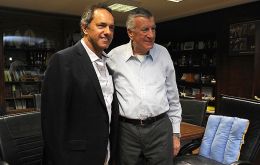
Argentina's largest political movement, almost hegemonic, but currently in the opposition under the name of Justicialista Party (PJ), announced this week a shadow Cabinet, saying they will work hard to return to power after losing last year’s election to President Mauricio Macri.
-
Friday, June 3rd 2016 - 19:40 UTC
Argentine hopes dashed on Falklands, Antarctica: Continental Shelf Commission refused to consider three major claims
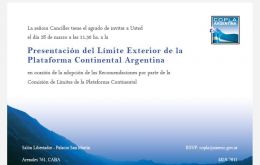
In April 2009, Argentina submitted a formal claim to sovereignty over an exceptionally large continental shelf, across hundreds of miles of the sea-bed to the east and south of Argentina. This year, in March, newspapers around the world incorrectly reported the whole Argentine submission had been endorsed.
-
Friday, June 3rd 2016 - 19:34 UTC
Delimitation of the Argentine continental shelf

By Professor Peter Willetts, South Atlantic Council (*) - The Argentine Foreign Ministry announced on 28 March 2016 that it had gained international recognition of a claim to an exceptionally large continental shelf. But they were mistaken. Argentina had made a submission to the Commission on the Limits of the Continental Shelf (CLCS) on 21 April 2009 to claim sovereignty rights over the resources of the sea-bed.
-
Thursday, June 2nd 2016 - 14:09 UTC
Monsanto and Argentina closer to an agreement on exports inspections dispute
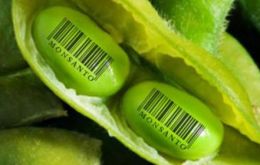
Monsanto Co., eager to get royalties from growers in Argentina on genetically modified soybeans, said on Wednesday it was still trying to resolve a dispute with the government over inspections, while an agricultural ministry source said a deal may be reached in the coming days.
-
Thursday, June 2nd 2016 - 09:20 UTC
Argentina describes Falklands' governor speech on links as 'positive', but they must be bilateral through UK
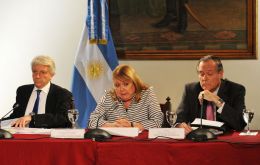
Argentina believes there is an opportunity to improve the relation with the Falkland Islanders, and 'we are exploring available options', but those links must be channeled through bilateral relations with the United Kingdom, since the Islands dispute is with the UK.
-
Thursday, June 2nd 2016 - 09:03 UTC
Argentina's industrial production down 6.7% year on year in April
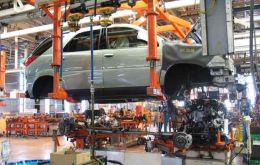
Argentina's industrial output contracted 6.7% in April compared with the same month last year, the country's newly revamped Indec statistics agency said, punctuating the effect of recent fiscal austerity measures.
-
Wednesday, June 1st 2016 - 08:51 UTC
Night of fire and violence in Ushuaia as protestors are evicted from Government House grounds

Ushuaia suffered a night of violence, tear and pepper gas and fire when riot police dislodged an 80-day protest camp and tents of striking teachers and government employees next to Tierra del Fuego Government House. Seven people were reported injured including a policeman and a fireman, when tents were set on fire, and unions claimed it was a savage and brutal display of government repression
-
Tuesday, May 31st 2016 - 18:47 UTC
Argentina’s Eternal Debt Problem

By Carmen Reinhart (*) Argentina recently emerged from nearly 15 years of the most litigious sovereign default in modern times, if not ever. Now it has the opportunity to reenter the global financial system and build a more stable and prosperous future. It is a chance that the country must be careful not to squander.
